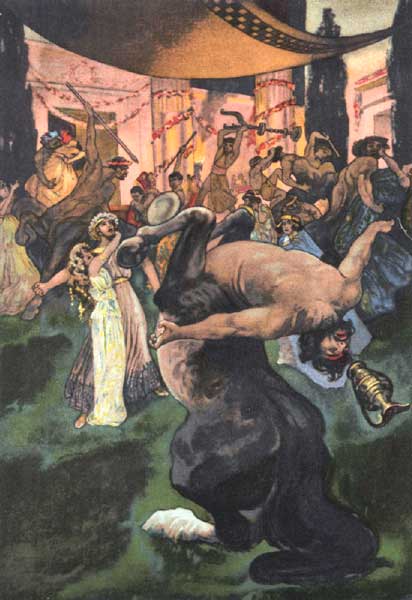Eurytion /jʊəˈrɪʃən/ (Ancient Greek: Εὐρυτίων,[1] "widely honoured") or Eurythion /jʊəˈrɪθiən/ (Εὐρυθίων) was a name attributed to several individuals in Greek mythology:
Eurytion, the king of Phthia.[2]

Pausanias about the Zeus Temples sculptures: In the center of the pediment is Peirithous. On one side of him is Eurytion, who has seized the wife of Peirithous, with Caeneus bringing help to Peirithous, and on the other side is Theseus defending himself against the Centaurs with an axe.
Eurytion, a Centaur of Arcadia who demanded to marry the daughter of Dexamenus of Olenus, either Mnesimache or Deianira, or who threatened violence against his daughter Hippolyte on the day of her marriage to Azan. Her father was forced to agree, but Heracles intervened on her behalf and killed the wild horse-man.[3][4][5]
Eurytion, another Centaur, of Thessaly, who attempted to carry off the bride of Peirithous, king of the Lapiths, on their wedding day. He and his fellows were killed in the fight with the Lapiths that followed, the Centauromachy.[6][7] Ovid refers to him as "Eurytus",[8] and by his Latinized Greek name "Eurytion".[9]
Eurytion, son of Ares and the Hesperid Erytheia, who bore him "beside the silver-rooted boundless waters of the river Tartessus, in the hollow of a rock," according to a Strabo's quote from a lost poem of Stesichoros. He, and the two-headed dog Orthrus, were the guardians of the cattle of Geryon and were killed by Heracles.[10][11][12][13] This Eurytion was also used as a character in the Percy Jackson book The Battle of the Labyrinth.
Eurytion, a Trojan archer during the Trojan War, son of Lycaon and brother of Pandarus. He participated in the funeral games of Anchises.[14]
Eurytion, a defender of Thebes against the Seven, was killed by Parthenopaeus.[15]
Eurytion, an alternate name for a Gigas who was slain by Artemis.[16]
References
gen.: Εὐρυτίωνος
Apollonius Rhodius, Argonautica, 1. 74
Pseudo-Apollodorus, Bibliotheca 2. 5. 5
Hyginus, Fabulae, 31 & 33
Diodorus Siculus, Library of History, 4. 33. 1
Pausanias, Description of Greece, 5. 10. 8
Homer, Odyssey, 22. 295
Ovid, Metamorphoses, 12. 219
Ovid, "Ars Amatoria", 1.593
Pseudo-Apollodorus, Bibliotheca 2. 5. 10
Hesiod, Theogony, 293
Tzetzes on Lycophron, 651
Servius on Aeneid, 8. 299
Virgil. Aeneid. Book V, 514
Statius, Thebaid, 9. 749
Apollodorus. (trans.) Frazer, Sir James George. The Library, Volume I. Harvard University Press, 1921.; pg. 46.
See also : Greek Mythology. Paintings, Drawings
A - B - C - D - E - F - G - H - I - J - K - L - M -
N - O - P - Q - R - S - T - U - V - W - X - Y - Z
Α - Β - Γ - Δ - Ε - Ζ - Η - Θ - Ι - Κ - Λ - Μ -
Ν - Ξ - Ο - Π - Ρ - Σ - Τ - Υ - Φ - Χ - Ψ - Ω
Retrieved from "http://en.wikipedia.org/"
All text is available under the terms of the GNU Free Documentation License
| Ancient Greece
Science, Technology , Medicine , Warfare, , Biographies , Life , Cities/Places/Maps , Arts , Literature , Philosophy ,Olympics, Mythology , History , Images Medieval Greece / Byzantine Empire Science, Technology, Arts, , Warfare , Literature, Biographies, Icons, History Modern Greece Cities, Islands, Regions, Fauna/Flora ,Biographies , History , Warfare, Science/Technology, Literature, Music , Arts , Film/Actors , Sport , Fashion --- |

